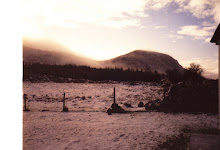via Atlas Film
By Daniel Greenwood
It’s strange to call Andrei Rublev an epic, a term modern cinema will attribute to vast landscapes clogged with soldiers, usually seen as specks from a computer enhanced birds-eye-view. And Andrei Rublev’s first scene has something of the sort, but here the figures are real, as are the wild horses seen by a man escaping in a hot air balloon. The modern epic is the Lord of the Rings Trilogy (Peter Jackson, 2001-2003), a gargantuan trio of films released across the space of three years. Perhaps where Lord of the Rings is epic in its visual grandeur, Andrei Rublev is epic in its spirit. Like all of Russian director Andrei Tarkovsky’s films, it feels like there are unfathomable depths to the characters and also the plot that doesn’t ever really surface.
Little is known about Andrei Rublev, the fifteenth-century Russian painter, and so Tarkovsky’s Rublev (Anatoli Solonitsyn) is a vision of the painter as imagined by the director. In many ways Tarkovsky sees himself in the character of Rublev, another Russian with a great artistic talent, however many centuries and legends apart. Tarkovsky is one of the great autobiographical filmmakers, he says himself that it’s impossible for a director to make a film that is not about himself, and not from the perspective of how he sees the world. He felt that a director should maintain control of his film, and put all his honesty into it. Perhaps Andrei Rublev is as good because it feels genuine, brimming with wit.
Rublev struggles with the notion of God. He is drawn into his orthodoxy, underpinning the theme of Fyodor Dostoyevsky’s novel The Brothers Karamazov. Tarkovsky envisions Rublev as a monk called upon by Theophanes the Greek to paint the religious icons that are the concrete evidences of his existence to date. But Rublev’s talents are the cause of envy from factions of his brotherhood, particularly Kirill (Ivan Lapikov), an aspiring painter himself, and older than Rublev, who is gravely disappointed when Theophanes calls for Rublev instead. Kirill loses it, venturing out into the world, banished by his master under the charge of blasphemy as he wildly accosts Rublev, sullying his own nurtured faith.
Another important idea in Andrei Rublev is the severe existential angst of the protagonist. Rublev is drawn into the maelstrom of a pagan celebration, tied-up by a gang of men and accosted by a naked woman. She kisses him, and it’s unclear whether Rublev is disgusted by her flesh or his sexual desire inhibited for so long by his Orthodox beliefs. If Andrei Rublev is epic in its spirit, in its dealing with unanswerable, existential dilemmas, it is remarkable that it feels as compact and focused upon its story. There are no certified heroes here, barely villains - the rampant Tartars are seen as murderers with a great sense of humour, and their looting is portrayed as the actions of men keenly picking the fruits of a Godless earth. In this case the fruits are torture and gold, violence and rape.
Much of the film concerns Rublev vying with the weight and expectation his talent brings. Ultimately, he is a man of few words, taking a vow of silence in his darkest moments. As an artist his burden mirrors Tarkovsky’s, who in his day was hailed as a visionary by the Russian people, but was equally damned by those disbelieving of (or misunderstanding) his talents. Tarkovsky battled the Soviet film authorities, and it was years later than 1966 that Andrei Rublev was screened to an audience outside of the Soviet Union. Tarkovsky suffered claims of mysticism from the ruling film authority Goskino, and pivotally it was they who had the say of whether his film could be shown or not - they were paying for it.
It’s stunning to consider this is only Tarkovsky’s second film and his first with Solonitsyn, an actor who went on to be his stapled lead. It’s stunning also in the light of Andrei Rublev’s depth of ideas. It’s a success because Tarkovsky has come close to matching Rublev, though in very different eras and through completely separate means, Tarkovsky has created something timeless and true that can be fed upon for years to come.

No comments:
Post a Comment